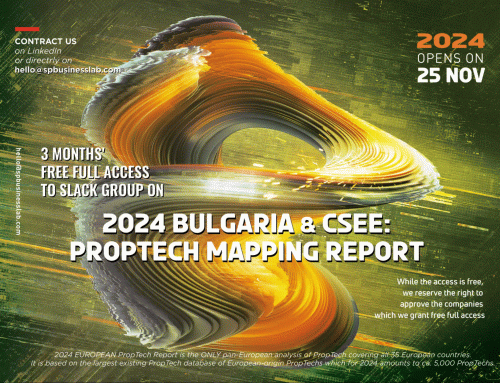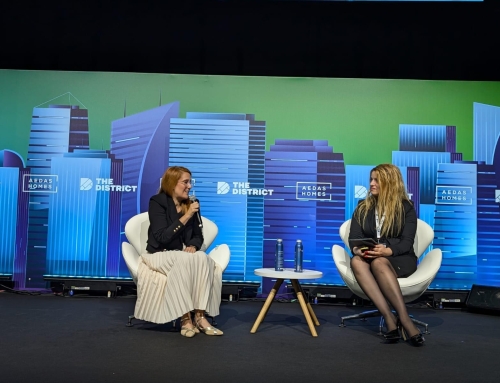FINTECH & PROPTECH: Trends on the overlap PART 1
Postbank: The use of digital channels has accelerated rapidly, and is set to continue, even once the COVID-19 situation has eased.
A set of several type of technologies was heavily used in the Covid environment not only in front office. In the middle and back office AI and Machine learning proved their efficiency.
As Philip Kotler stated „The future isn’t ahead of us. It has already happened.“
That is even more valid in the current environment, when we are facing booming development in the artificial intelligence, machine learning, Natural Language Processing, Sensor tech, Robotics, Augmented, Mix and Virtual Reality, IoT and Blockchain. Further development in these technologies have potential to change significantly vast amount of process even all business environment.
The interview is completed by Sylvia Pavlova MBA CMC, Founder PropTech Bulgaria, Co-Founder PrEXCELerator Bulgaria.
This interview was part of the Bulgarian PropTech Business Show on RE:Connect 3.0 on 24 June 2021. Bulgaria was represented by PropTech Bulgaria at RE:Connect 3.0 – one of the largest PropTech events worldwide. And this is the 1st part of our conversation. See the other 2 parts here >
About Nikolay Lazarov:
Nikolay Lazarov is Head of Sales Individual Banking Division
He has more than 15 years professional experience in finance sector at various positions in leading banks in Bulgaria. Responsible for development and business results of the variety of business lines and distribution channels. Fully involved in building of business ecosystem and B2B development. Responsible for primary customers base including growth and life cycle management.
Mr. Nikolay Lazarov has been part of the team of Postbank since 2015, responsible for managing all sales activities for Mass and Affluent segments, incl. Branch network, DSAs, Mortgage Brokers, Telemarketing, Online sales, specialized Mortgage & Consumer Lending Centers, Premium Banking Centers, POS and ATM, Payroll and Primary Clients, Western Union Business.
About Petar Ivanov:
Petar is a Certified Real Estate Appraiser with experience in all fields of RE industry: valuation, financing, transactions, consulting and servicing. His track record includes closing many real estate deals, valuation of large portfolios of assets and participation in financing of different projects.
In EOS Bulgaria he is responsible for the sale process of diverse RE portfolio countrywide.
About Radoslava Lukanova:
Radoslava Lukanova is Head of Specialized Centers Department, Individual Banking Division
Mrs. Radoslava Lukanova has been part of the team of Postbank since 2005, and over the years, she has held various positions in the Branch Network Department, Credit Department, Sales Department. Since 2015, she has been responsible for the strategic positioning, development and sales of Postbank’s Housing Lending Centers (30 throughout the country).
In her portfolio, she has implemented a number of innovative projects for the Bulgarian market – implementation of innovations in specialized centers for Consumer Lending “Momento”, development of a network with shared locations for sales with the leading telecom A1 and introduction and positioning of the first Online Mortgage Center of Postbank.
About Dobrin Mirevski EMBA:
Dobrin is the IT Systems Development Manager at EOS Matrix Bulgaria. He specializes in the field of business development for the last 24 years. Most of his professional expertise he acquired while working for 3 multinationals in diverse industries – active pharmaceutical ingredients, automobile microelectronics and financial services. He’s been managing for them sales and customer service activities to over 25 countries on 5 continents. Meantime he was also consulting and teaching for Sales and Commercial negotiations.
-
What post-Covid-19 trends are there to be traced down in your market segment (or in thndustry as a whole, alternatively, in the society to have a direct say on your segment)?
What post-Covid-19 trends are there to be traced down in your market segment (or in thndustry as a whole, alternatively, in the society to have a direct say on your segment)?
Nikolay Lazarov [NL]: COVID-19 has affected significantly consumer behavior – staying at home and strong priority of online activities, digital sales, online services. This situation presents an opportunity for customers to explore a new lifestyle, as the lines between personal and work life are blurred. McKinsey and PwC reports that appx. 40 percent of customers who previously mainly used in-person channels to contact brands for support have now switched to digital channels as their main channel. Therefore, COVID-19 is forcing all sectors to reconsider their business models, their structure and their routes to market. The retail banks made transformation of its business model from traditional banking to a contemporary customer-oriented financial servicing, providing agile solutions. The banks also working on to keep their brick-and-mortar distribution channels and at the same time to provide eligible scope of digital financial services. At the end of the day usage of digital channels has accelerated rapidly, and is set to continue, even once the COVID-19 situation has eased.
What has changed? Many things have changed. Definitely, Covid-19 was an ultimate storm that we hadn’t expected. No one expected it. No one had previewed it in the forecast and the budget. The speed and prediction time lapse was very unusual for us. We at Postbank invested no more than a week, and we had to change our whole strategy for the next year. Definitely, these were quite tough exercises but at the end of the day, it has been successful as we turn back and see the bank’s result in this same pandemic year. We think that we gained from the market due to our strategy, due to the fact that we were very fast in making some decisions, and due to the fact that we had started preparing our digital strategy long before Covid-19. Technology is not a thing which starts now. The process started 50-60 years ago with the first ATMs, the first automated machines, and it is a steady process which has not been initiated by Covid. Those bank institutions who were prepared to take the decision to switch to a remote contact, remote interaction with the client are taking the advantage now.
Covid-19 was a totally new phenomenon for us, but more or less, due to our previous preparation we were ready to introduce immediately some of the solutions we had been preparing.
SP: You had high flexibility to react. You had had a plan B.
NL: Exactly. We had a plan B, and what we saw was that both we and our clients in the first month of Covid lockdown were shocked. All of us. And if we divide clients in two groups, the first client type had been heavily involved in brick-and-mortar channels, and the second client type was more involved through digital channels. The former – the traditional – client started to shift. We see something interesting. Pre-Covid, the majority of clients had preferred to dig information online and to buy offline. This is the traditional way. Due to Covid this trend has shifted. The client who is making his/her research online, also started buying online. This has been the major shift in the industry. The traditional client who has always been very much involved into the traditional way of buying, s/he has just postponed the purchase. But the client who were in the middle, they shifted. It was very important at this point to have a ready channel. This was the major difference.
Petar Ivanov [PI]: I will start with a general comment on the real estate market. The RE market is a slow market, slower than any other. So, the trends here have been forming and developing not for one or two years’ time, but for one – two decades. The corona virus was a shock mainly to segments with restrictions, such as hospitality, retail, offices. The real estate cycle takes usually 18 years and passes through 3 repetitive stages. So, I believe that at the moment we are in the final 7-years’ stage, in the middle of this final stage. This is a stage of growth with ultimate levels of property prices, with ultimate levels of construction activities, and demand. And even the corona virus could not disturb this cycle which proves true for many years in the developed market. I kindly cannot agree with the term of ‘post-Covid trends’, because I believe the trends were the same before Covid. And the main trends, as we know them, are digitilization, urbanization, remote work, online shopping, and shorter supply chains. The process is not straight-foreward. For example, online shopping does not suppose that we’ll not have shopping centers in the future.
SP: Yes, yes, sure. The mix between brick-and-mortar and online will be different.

PI: Regarding home office, people who work from offices, and now are forced to work from home, are very small fraction of all working people. More people work in the field, in the streets, in the factories…Definitely, office will not die, too.
SP: It will be transformed, but definitely, will not become void.
Dobrin Mirevski [DM]: A key trend that was highlighted by Covid and is here to stay is self-service. We see more and more customers willing and ready to carry out the interaction at their own pace, self-serving, rather than being led by a representative of the supplier. Respectively, many organizations pro-actively work now towards providing these facilities.
The hybrid work model is another one that will stay. Working from home as long as 18 months for most of the organizations is long enough to bust all of the bad myths on remote work and change their perspective. This does not mean all jobs that allow for remote will remain remote, but it does mean that “working Mon-Fri, 8 to 5, out of a dedicated office desk” for these is a thing of the past. Forever. Replaced by the much more flexible hybrid setup.
Last, but surely not least, consciously and deliberately rethinking everything we do from a digital perspective and preparing upfront for the “next time” is another global trend for almost every single business organization.











Leave A Comment